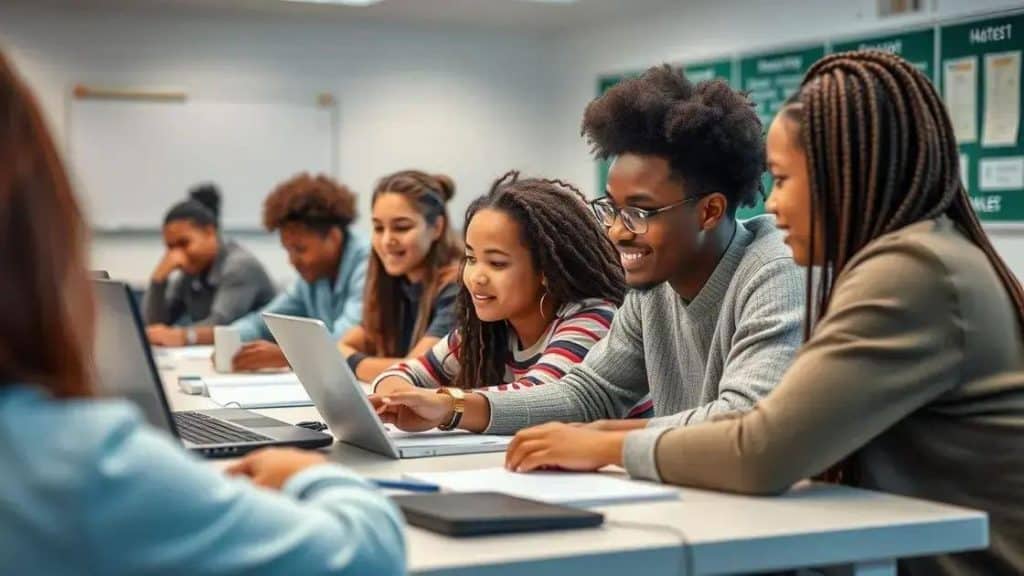Student academic performance trends 2025: what to expect

Anúncios
Student academic performance trends in 2025 will be shaped by technology integration, a focus on soft skills, enhanced mental health support, and personalized learning approaches, leading to improved outcomes for diverse learners.
Student academic performance trends 2025 are shaping up to be unlike anything we’ve seen before. With rapid changes in technology and teaching methods, how prepared are students to meet these evolving expectations? Let’s dive into the insights and predictions for the future of education.
Anúncios
Understanding the current academic landscape
Understanding the current academic landscape is essential for navigating student learning today. The educational environment has changed significantly, influenced by technology, teaching methods, and societal needs.
Technology’s Impact on Education
Technology plays a critical role in shaping academic performance. With the advent of digital learning tools, students can access resources anytime, anywhere. This flexibility enhances learning opportunities and supports diverse learning styles. Educators increasingly use platforms that facilitate interactive and personalized learning experiences, making lessons more engaging.
Anúncios
Changing Teaching Methods
As the academic landscape evolves, so do teaching methods. Traditional lectures are often being replaced by more interactive, collaborative approaches. This shift encourages students to actively engage with the material, fostering critical thinking and problem-solving skills. Furthermore, project-based learning allows students to apply what they’ve learned in practical scenarios.
- Interactive digital tools enhance student engagement.
- Collaboration encourages critical thinking.
- Real-world applications of knowledge improve retention.
Additionally, educators focus on developing essential soft skills, such as communication and teamwork. These skills are vital for success not only in school but also in students’ future careers. Today, it’s important for students to be prepared to adapt to an ever-changing job market.
Balancing Academics and Mental Health
Understanding the stresses that come with academics is crucial. Education systems are becoming more aware of the importance of mental health. Schools now provide resources to support students facing anxiety and pressure. This approach helps create a healthier learning environment, allowing students to thrive academically and emotionally.
By fostering a supportive atmosphere, schools can enhance student academic performance. More importantly, they can help students learn how to manage stress, leading to better outcomes both in and out of the classroom.
Factors influencing student performance

Several key factors influencing student performance play an essential role in shaping academic success. These factors range from personal circumstances to the environments in which students learn.
Home Environment
The home environment significantly impacts student performance. Supportive family dynamics create a foundation for academic success. When parents are involved in their children’s education, it fosters motivation and helps students feel valued.
- Encouragement from family boosts confidence.
- Access to resources like books and technology aids learning.
- A quiet and organized study space enhances focus.
On the other hand, challenging home situations can hinder progress. For example, students facing instability may struggle to concentrate and achieve their academic goals.
Teacher Influence
Teachers have a profound effect on student engagement and academic growth. A motivated teacher can inspire students to exceed their own expectations. They bring subjects to life through their passion and creativity, making learning enjoyable.
Teachers also play a key role in addressing individual learning needs. They can implement different strategies to ensure that all students can thrive regardless of their abilities. This personalized approach can drastically improve performance.
Peer Relationships
Peer relationships also shape student experiences. Positive friendships often lead to a supportive and encouraging learning environment. Students who collaborate and study together tend to perform better academically than those who work in isolation. A sense of belonging promotes not only academic achievement but also emotional well-being.
However, negative social dynamics can create stress, impacting focus and motivation. Cultivating healthy peer interactions fosters a more balanced academic experience.
Motivation and Mindset
Finally, motivation and mindset are crucial for academic performance. Students with a growth mindset believe they can improve through effort. This attitude encourages resilience when facing challenges. On the contrary, students with a fixed mindset may shy away from difficult tasks, fearing failure.
Encouraging self-reflection and goal-setting can help nurture a positive attitude toward learning. Schools can promote this mindset through programs that celebrate effort and progress.
Predictions for student outcomes in 2025
Predictions for student outcomes in 2025 are both exciting and complex. As educational methods evolve, we can expect significant changes in how students learn and succeed.
Technological Integration
By 2025, technology will be deeply integrated into learning environments. Virtual and augmented reality may become commonplace, providing immersive experiences that enhance understanding. Students will have opportunities to interact with subjects in ways that traditional methods cannot offer.
- Virtual classrooms can bridge geographical gaps.
- Augmented reality apps could bring subjects like history and science to life.
- Data analytics help educators tailor learning experiences to individual needs.
This technology will allow for personalized learning paths, where students can progress at their own pace. As a result, students are likely to have a more tailored educational experience.
Focus on Soft Skills
In addition to academics, schools will increasingly emphasize soft skills. Communication, teamwork, and adaptability will be essential in preparing students for future careers. Employers are looking for candidates who can work well in diverse teams and handle challenges creatively.
Schools will implement programs that encourage these skills through project-based learning. Engaging in real-world projects allows students to collaborate and learn from each other while developing their abilities to communicate effectively.
Increased Mental Health Support
By 2025, mental health support will be a priority in schools. The understanding of mental well-being’s impact on academic performance is growing. Schools will provide resources to help students manage stress and anxiety, creating a healthier learning environment.
Students will have access to counseling services, mindfulness programs, and stress management workshops. These initiatives aim to foster resilience, enabling students to approach challenges with a positive mindset, thus improving their overall performance.
Global Awareness and Cultural Competence
Lastly, as the world becomes increasingly interconnected, students will be better prepared for global citizenship. Education systems will focus on global issues, cultural awareness, and empathy. Students will learn about different cultures and social challenges facing the world today.
Such education will foster understanding and respect for diversity, essential skills in a multicultural society. By 2025, students will be more equipped to engage with and contribute to a globalized world.
Strategies for improving academic success

Implementing effective strategies for improving academic success is crucial for both students and educators. These approaches can significantly enhance learning experiences and outcomes.
Goal Setting
One key strategy is setting clear and achievable goals. When students define what they want to accomplish, they are more likely to stay focused and motivated. Goals should be broken down into smaller, manageable tasks, making them less overwhelming and easier to achieve.
- Use SMART goals: Specific, Measurable, Achievable, Relevant, Time-bound.
- Track progress regularly to stay motivated.
- Celebrate small achievements to boost confidence.
This method helps students gain a clearer sense of direction, enhancing their academic journey.
Active Learning Techniques
Active learning involves engaging with the material rather than passively receiving information. This can include discussions, group projects, and hands-on activities. Students who actively participate in their learning process tend to retain information better.
Teachers can incorporate techniques like:
- Think-pair-share activities to encourage collaboration.
- Interactive quizzes to reinforce learning.
- Group presentations to develop communication skills.
By encouraging active engagement, teachers can foster a deeper understanding of the material.
Time Management Skills
Effective time management is essential for academic success. Students should learn to prioritize tasks and manage their schedules effectively. Creating a study plan can help them allocate time for each subject and reduce last-minute cramming.
Key tips for managing time include:
- Creating a daily or weekly planner to organize assignments.
- Setting specific study blocks to focus on one subject at a time.
- Taking regular breaks to maintain focus and avoid burnout.
These skills will serve students well throughout their academic careers and beyond.
Seek Academic Support
Finally, students should not hesitate to seek help when needed. Utilizing available resources can make a significant difference in understanding challenging material. This includes attending tutoring sessions, joining study groups, or reaching out to teachers for clarification.
Building a support network can enhance a student’s educational experience. Peers, mentors, and family members can provide encouragement and motivation, contributing to overall academic success.
FAQ – Frequently Asked Questions about Student Academic Performance Trends 2025
What are the key factors influencing student performance?
Key factors include home environment, teacher influence, peer relationships, and motivation. These play a significant role in shaping academic outcomes.
How can students improve their academic success?
Students can improve success by setting clear goals, using active learning techniques, managing their time effectively, and seeking academic support when needed.
Why is mental health support important in education?
Mental health support is crucial as it helps students manage stress and anxiety, leading to better focus, engagement, and overall academic performance.
What predictions can we expect for students in 2025?
In 2025, students may experience greater technology integration, an emphasis on soft skills, increased mental health resources, and enhanced global awareness in their education.





